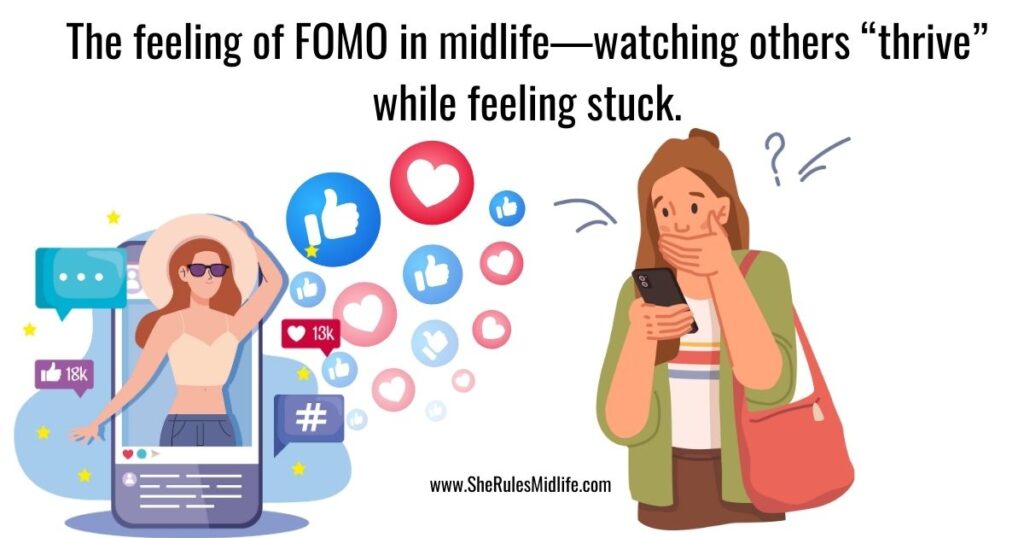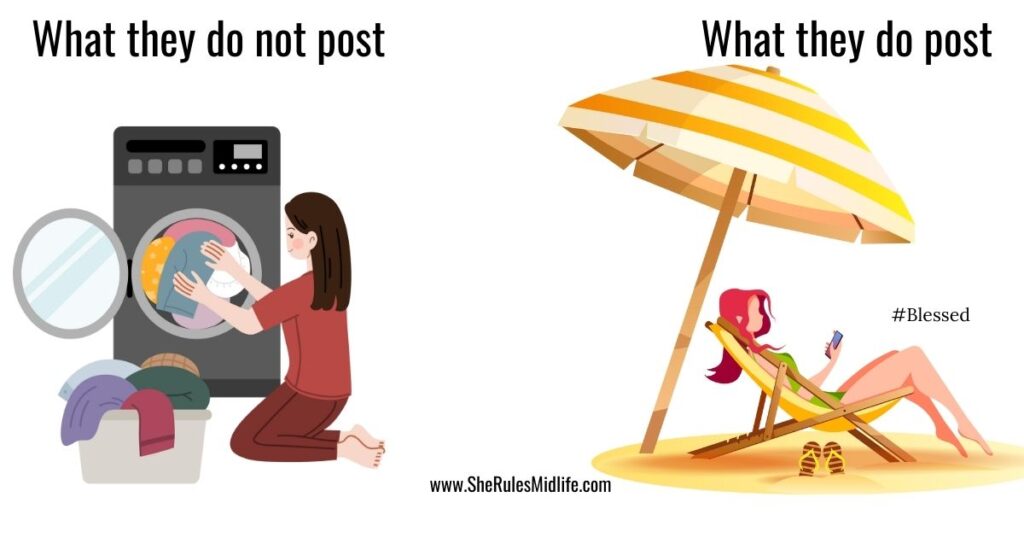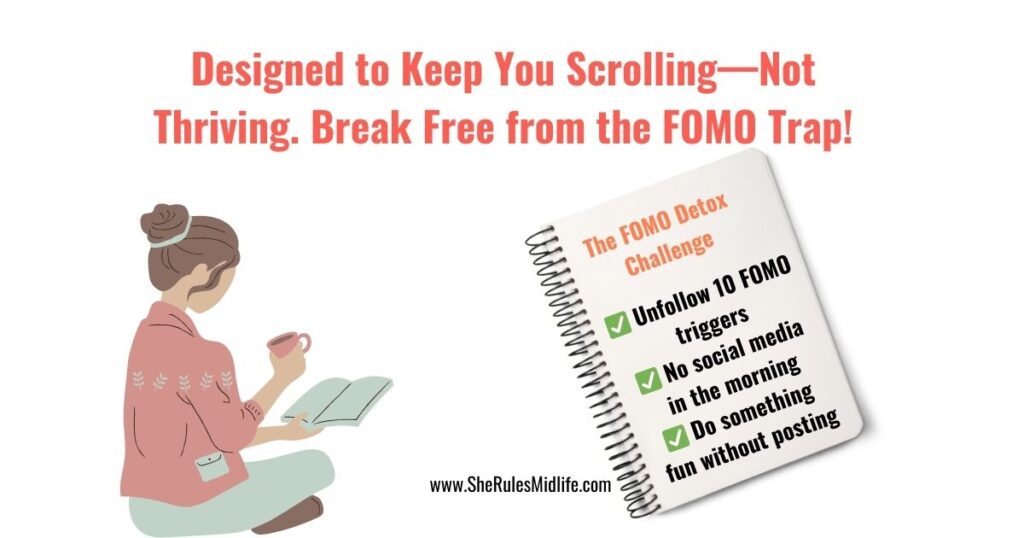Growing up in the 80s and 90s, we never had to deal with FOMO (Fear of Missing Out)—because honestly, how could we miss out on something we didn’t even know existed?
There was no endless scrolling, no pressure to “keep up” with everyone’s curated highlight reel. If you weren’t invited to something, you didn’t see it plastered on Instagram with a fancy caption.
Life moved at its own pace.
Fast forward to today, and suddenly, everything is urgent.
If you don’t click, book, subscribe, RSVP, or sign up immediately, you might just miss out on the “biggest opportunity of your life!
It’s exhausting. Where did this madness come from?
How Did FOMO Become a Daily Struggle?
FOMO(Fear of missing out)is no accident. It is a strategically placed in our modern day routine- thanks to the how the robot driven world is shaping up.
One moment, life is good—you’re sipping your coffee, feeling accomplished just for existing.
Then, you unlock your phone, and suddenly, your entire life feels like a massive underachievement.
Everyone else is thriving.
✔ Your old classmate?
Bought a beach house, retired early, and now “casually” runs a travel blog.
✔ Your work bestie?
Left corporate life, started an e-commerce business, and is apparently making six figures selling handmade candles.
✔ Some random grey haired woman?
Woke up at 5 am, ran 7 kms, made a kale smoothie and posted it on instagram.
And you?
Still sitting there, still in pajamas, debating whether you should really iron and fold that three-day-old laundry pile coz now its used to sitting in a pile. It won’t hurt its feelings.
Welcome to Fear of Missing Out (FOMO)—the psychological scam that tricks you into believing everyone else is winning at life while you’re somehow failing.
But if you got to rule midlife, know -fear of missing out is a lie. And today, we’re calling it out.
What Is FOMO (And Why Do We Still Have It in Midlife?
FOMO (Fear of Missing Out) isn’t just some trendy Gen Z issue—it’s a psychological phenomenon that makes you feel social exclusion because you believe others are having better experiences.

Why FOMO hits differently in midlife
✔ In your 20s,
-FOMO was about missing a party.
-Not having the trendy outfit.
-Missing out the latest released Disney movie
✔ In your 30s,
-it was about career promotions, weddings, and baby showers.
✔ In your 40s & 50s?
It’s about early retirements, perfect marriages, successful kids, “forever homes,” and people aging like fine wine while you struggle to tame those few unruly frizzy grey hair.
The worst part?
It’s all on display, 24/7, thanks to social media.
Why FOMO Feels So Real (Even When It’s Not)
FOMO isn’t just a passing emotion—it’s a psychological process that hijacks your brain and convinces you that you’re behind in life.
Here’s why it hits so hard:
✔ Before social media? You had no idea what people were doing unless you bumped into them at the grocery store or spoke with them after dialling their numbers on your rotisserie phone.
✔ Now? Your social media feed makes sure you’re aware—in high-definition, with filters and a motivational caption.
In the past, if your high school friends went on a girls’ trip without you, you never knew.
Now? Your social media feed will rub it in your face with slow-mo boomerangs, matching outfits, and hashtags like #blessed.
And your reaction?
Midlife FOMO Spectrum:
– 0.1 seconds in → “Oh, good for them.”
– 5 seconds in → “Wait… was I supposed to be invited?”
– 10 seconds in → Checks texts just in case you missed the invite.
– 20 seconds in → “Nope. Betrayal. I live in exile now.”
Welcome to modern-day FOMO.
How Social Networking Sites are Engineering Your FOMO (On Purpose)
Social media platforms profit from your insecurity.
The longer you scroll, the more ads you see.
And to keep you scrolling, they have to trigger something—whether it’s peer pressure, a sense of social exclusion, or the subtle fear that your life isn’t measuring up.
Social networking sites are designed to make you stay continually connected.
Problematic social media use leads to compulsive checking.
Why else are you refreshing Instagram at 2 AM?
Social media engagement = dopamine rush.
Likes and comments are digital breadcrumbs designed to keep you hooked.
The illusion of “perfect lives” is carefully curated.
No one posts their 3 AM stress crying—just their vacation highlights.
Fun Fact: Ever notice how people only post the peak moments—vacations, anniversaries, job wins? No one posts the BTS footage of them stress-eating, crying -in-shower, yellin in the pillow frustrations on social media?

The Hidden FOMO Triggers You Haven’t Noticed
Though mostly social media platforms are the obvious FOMO trigger, they are the sniper kinds messing with you without you realizing it.
1️⃣ Productivity FOMO
Seeing people hustling non-stop can make you feel lazy—even when you’re exhausted.
Reality check: Rest is productive too.
2️⃣ “Life Stage” FOMO
Midlife hits differently when everyone is on wildly different paths.
Some friends are retiring, launching second careers, or traveling the world, while you’re just wondering why your back hurts after sleeping.
3️⃣ Relationship & Parenting FOMO
- Someone’s posting a “happy couple” anniversary post, complete with sunset beach photos and #soulmates.
- Someone else’s kid just got accepted to an Ivy League college, and they’re already planning the graduation party.
- Meanwhile, you’re debating whether eating another slice of cheesecake will completely derail your “sugar-watch” diet.
The Effects of FOMO on Your Mental Health (It’s Worse Than You Think)
✔ FOMO fuels anxiety & stress.
You’re constantly wondering if you’re doing enough.
✔ It wrecks self-esteem.
Your regular life starts looking painfully ordinary.
✔ It triggers social media addiction.
The more you compare, the more you scroll. The cycle continues.
✔ It lowers life satisfaction.
Because apparently, everyone else is “living their best life.”
In simple terms: The more you compare, the worse you feel. And yet, we keep scrolling.

How to Stop that Fear of missing out
Cut Back on Problematic Social Media Usage
Well, cutting back on “PROBLEMATIC” social media usage is the key. The key is to understand the usage of social media for fuelling such behaviours is the problem, social media itself is not the problem.
Now the question is how do you mindfully use social media so that you can let the fear of missing out worm inside you starve itself to death.
– Mute/unfollow accounts that trigger FOMO.
– Stop checking your phone first thing in the morning.
– Reduce time spent on social media.
Focus on Real-Life Experiences (Instead of Watching Others Live Theirs)
– Get back to hobbies that make YOU happy.
– Prioritize real-life relationships over digital ones.
Reframe Your Mindset (Because Comparison is the Thief of Joy)
– Use positive self-talk instead of comparison.
– Shift focus to what makes you happy NOW.
– Stop looking for external validation from likes and comments.
5 Powerful Affirmations to Combat FOMO & Build Self-Confidence
1️⃣ Sharing my life is fun—but my happiness isn’t measured in likes.
I post because I love to, not because I need approval.
2️⃣ I am living my life, not performing it.
Likes don’t define my joy—real-life experiences do.
3️⃣ I don’t need to be everywhere, all the time, to be fulfilled.
Missing out on one thing means I’m fully present for something else.
4️⃣ I celebrate others without questioning my own journey.
Social media shows moments, not daily life—and that’s okay.
5️⃣ I am enough—online, offline, and everywhere in between.
My self-confidence comes from within, not from metrics on a screen.

The FOMO Detox: 7 Days to Take Back Your Life
📅 Day 1: Unfollow 10 accounts that trigger FOMO.
📅 Day 2: No social media for the first hour after waking up.
📅 Day 3: Spend a day without checking social media.
📅 Day 4: Do something fun—WITHOUT posting it.
📅 Day 5: Start a gratitude journal.
📅 Day 6: Turn off notifications.
📅 Day 7: Re-evaluate: Do you really feel like you “missed out”?
👉 Want a printable version of this challenge? Grab my FREE ‘7-Day FOMO Detox’ guide!
The Verdict
Social media isn’t evil. The problem isn’t posting—it’s letting it control how you feel.
✔ The problem isn’t sharing your life.
✔ The problem is hankering for likes, comparing yourself, and feeling “less than” because of a stranger’s curated content.
The problematic social media use is affecting your mental health, not the social media users as much.
The solution of a problem begins by taking responsibility on yourself.
Bring your focus on what is in your control –
your social media apps.
your internet addiction.
your negative emotions.
your social interactions.
your social connections.
your social circle.
your well being.
Fear of missing out begins in our head, but it shouldn’t dictate our lives—turning molehills into mountains.

Final Thoughts: FOMO is a Scam—Don’t Fall for It
Social networking sites are here to stay, and their entire function is to keep you hooked—playing with emotions that either excite you or make you feel deprived.
It’s a dopamine rollercoaster, designed to keep you scrolling.
But here’s the truth: Mental health & self-esteem matter more than likes & follows.
Comparison is a trap—focus on your own joy, not someone else’s highlight reel.
We weren’t born to be slaves to an algorithm. Your emotions shouldn’t rise and fall based on social media posts. You control your happiness—not the internet.
What’s the dumbest thing social media ever made you feel FOMO about? Drop a comment—I promise, we’ve all been there!

